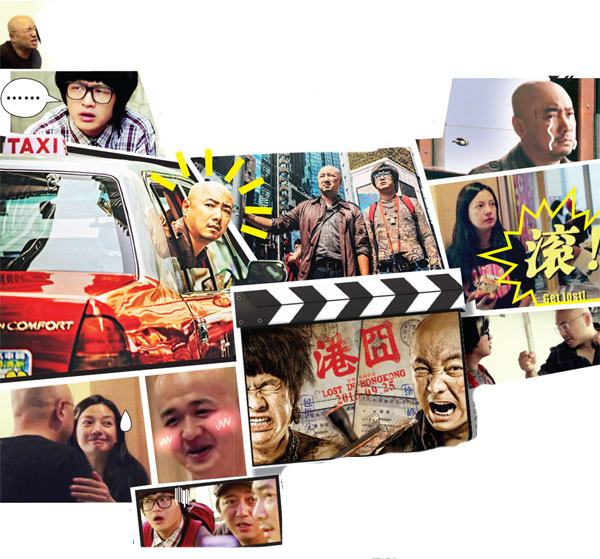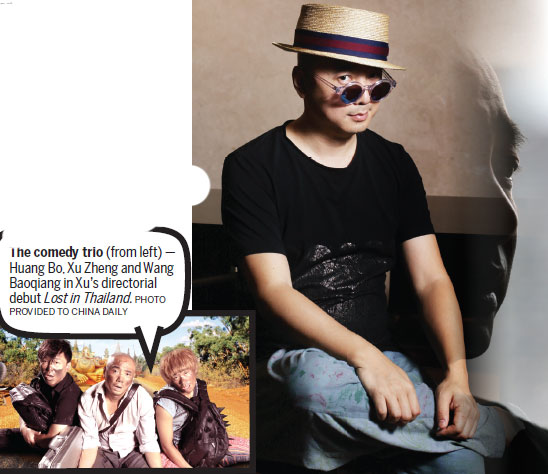China's King of Comedy
Updated: 2015-08-11 09:03
By Evelyn Yu(HK Edition)
|
|||||||||
"Laughter", goes the old saying, "is the best medicine". Well the doctor has arrived and he's comedic actor-director Xu Zheng, who has found the right prescription for making Chinese audiences laugh. Evelyn Yu met him.
How does one make hard-working Chinese people laugh? Xu Zheng, the director and co-star of Lost in Thailand, China's highest-grossing domestic comedy of all-time, may have found the answer. The film was greeted with uproarious laughter in Chinese cinemas, where more than 32 million people paid to watch the on screen antics.
China's film industry continues to struggle to compete with Hollywood blockbusters. Xu's slapstick road comedy in 2012 shot on a low $4 million budget, unexpectedly edged out 3D Titanic and Avatar on its way to a $200 million box office record, that stood until last month. Xu's second directorial outing, Lost in Hong Kong, is predicted to rock audiences again this September.
The king of comedy reflects that Chinese audiences crave "light" movies, portraying the daily lives of people like them. Seated barefoot on a sofa in the lounge of his hotel room in Shenzhen, Xu, clad in a T-shirt, explained his formula for making Chinese audiences laugh.
"Now, many Chinese like to say I am so 'jiong'," Xu said, referring to a coined Chinese word that graphically captures an expression of awkwardness and foolishness. It is also included in the Chinese title of his two movies. Xu's screenworks plucked from the foolishness of mundane encounters that might happen to anyone, triggered the laughter among audiences comprised of the very wealthy and ordinary people.
Xu has a natural flair for comedy. His bald head, round face and white teeth revealed by his broad grin can make audiences laugh, just on the strength of his appearance.
The movie celebrity's career traced back to his youth, growing up in Shanghai, he began, while still in primary school, as a regular performer with Children's Palace.
That led to a string of TV dramas and cinematic films, at the beginning of a career that has endeared him to Chinese audiences as a comedic actor. But Xu wanted to go "beyond acting". "It's too passive," he complains. There were many roles he wanted to play, but in the end, he wasn't chosen for the part. Sometimes, even when picked for a role, he wanted to read a line of dialogue in his own way, but in the end, had to accept the director's interpretation. Becoming a director himself was the path to fulfill his cinematic dreams.
Xu finds playing the roles of director and performer at the same time, while shooting a film, hectic. He trekked across a river torrent, breast-deep, covered with mud and leaves on his bald head. Clambering out of the water, he headed straight for the monitor and begins barking out directions to the other players. Many scenes require several takes. Xu, describes himself as having a low laughter threshold, finds it easier to laugh through the many trials of shooting, than to get angry.
Laughter, he said, is simply an attitude. There are many things in our lives that don't go well. Instead of taking a tumble and fumbling through ill temper, he prefers to laugh out loud.
Chinese specific
China's Comedy King said it's hard to hit the funny bone of all Chinese audiences. The country is too big and too diverse. People living in third or fourth tier cities enjoy folk humor. Those in first and second tier cities don't get rustic humor. Lost in Thailand sets a stuffed-shirt businessman on an urgent quest to find his boss in Thailand, to get him to sign a big business deal. Seated beside the pompous ass on the airplane is a bumpkin who cooks pancakes for a living and who immediately importunes by marveling at the oversized screen on the businessman's cell phone.
The businessman, played by Xu, discovers to his horror that he has lost his passport in the taxi, and he must turn for aid, to the pancake cook. The businessman finds himself embroiled into a string of bizarre capers including falling into a river, taking flight on an elephant, massages causing excruciating pain, gangsters, lady boys and snakes. The steady stream of silly stunts and China-specific jokes had Chinese audiences practically rolling on the floor with laughter.
Shi Lei, film critic and producer-director at Now TV's Popcorn movie channel, commented that Xu's movie succeeded in its fundamentally "Chinese" character. "Among all the film genres, comedies have the greatest challenge, breaking international barriers and finding global audiences, Hollywood movies have international appeal because they import universal ideas like love, the super hero, war and themes from literature. Lost in Thailand succeeded in its localization," Shi said.
Shi referred to Xu's other road comedy Breakup Buddies as another example. Xu co-starred in the film, as a man trying to help his friend caught in a relationship crisis by taking him to Lijiang, a city in Yunnan province, except - not really. "The core story is Chinese, you tell any Hong Kong person or foreigner about the place they will be swept up in the images of marvelous scenery, but every Chinese will laugh. Chinese people know 'Lijiang' means a 'one night stand'," said Shi.
Xu has been playing his generic "urban snob" in a string of road comedies, along his adventures trail, audiences were brought a picture, hilariously close of Chinese people at the grassroots level.
Xu said he tries to make comedies that allow audiences to feel close and able to relate to his characters and to laugh at their own foibles. Behind all the moments of laughter, however, Xu reiterated that his comedy is rooted in "serious" life issues.
"Chinese people like go to the temple to ask for protective amulets, which they believe can bless them so that everything will go well." Xu said.
"Actually life is not like this," he continued, "Life is full of tribulation and hardship." He believes that life is a journey through which we stumble and fall. The story of two people who meet and grow together on their journey to obtain the true meaning of life fascinates him.
In Lost in Thailand, the businessman Xu played was meant as a reflection of the stressed-out, money-oriented modern China. After all the capers and mishaps along the journey, Xu's businessman was touched by the pancake cook's innocence and simplicity, and forcing the self-important businessman to reconsider his priorities and to become great friends with the poor cook he once disdained.
Lost in Hong Kong
That broader meaning in Xu's films continues in his second piece Lost in Hong Kong. This time Xu plays a married man who plans a tryst, reuniting with his first love in Hong Kong. The man's brother-in-law discovers the secret and follows, all the way in Hong Kong, leading to a laughter filled game of hide-and-seek.
"We all have a first love, and there is a simmering question about whether we should see her again. The movie is about letting go of your unfulfilled dreams," The director reflected on his second movie.
Like Thailand, Xu said, Hong Kong is a place where mainlanders like to travel. Hong Kong's culture has an influential effect on the mainland. Many people grew up listening to Cantonese songs. He said he hoped the audiences would enjoy viewing a story unfolding in a city with which they are well familiar.
The film's trailer is replete with explosions, smashed cars, a fall from a building, even a street gang fight. Xu's "cat and mouse" plot embodies a broad expanse of Hong Kong flavors.
Zhao Wei, named Best Actress at the Hong Kong Film Awards for Dearest, plays Xu's wife. Xu took a risk enlisting relative newcomer, Bao Beier, in a leading role as the brother-in-law. The actor played cameo roles in many films but remains unknown to most filmgoers.
Xu said he saw the sincerity of Bao's acting, though his performances may have been unpolished. Xu said he saw many things in Bao that fit the role of the brother-in-law perfectly.
To the amusement of reporters, at a press conference to promote Lost in Hong Kong in July, Xu, on a blue screen, had emblazoned the words "the Lost in Hong Kong, ask what you want, I will reply what I can, but maybe not everything I can, press conference." The message on the screen was tweeted and re-tweeted by scores of microbloggers.
Xu arranged a segment to let Bao read highly critical comments written about him on the Internet. Many contained hurtful expressions like they don't want to see the movie any more with the new face or asking Bao to get out of Lost in Hong Kong. Bao, standing before media representatives, read the vicious comments and cried.
Xu said it was not intended as a publicity stunt, but he didn't know Bao would cry. Much as Xu admires Bao's acting, Xu said the actor is still immature and lacks in confidence. "When I came on the stage, curses from audiences are much more malicious. The initiative was to see him laugh off the comments. But I didn't expect he would cry," Xu said.
Just as what Xu advocates in his movie, life is full of vicious comments and hardship, in the life's road journey the right attitude is laugh it off.
Contact the writer at evelyn@chinadailyhk.com


(HK Edition 08/11/2015 page10)